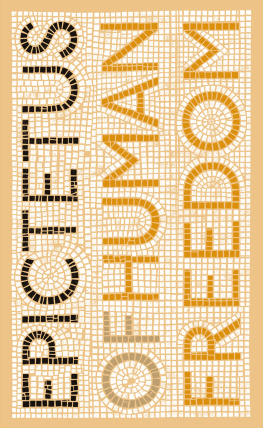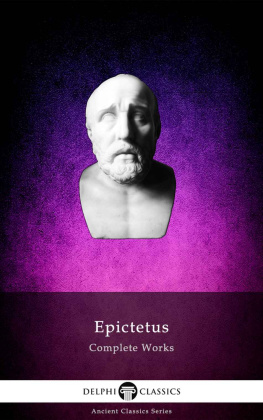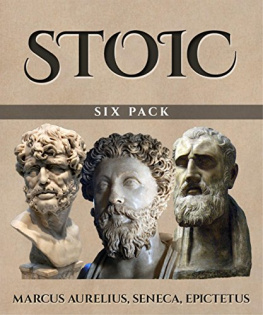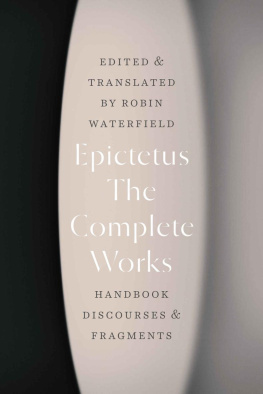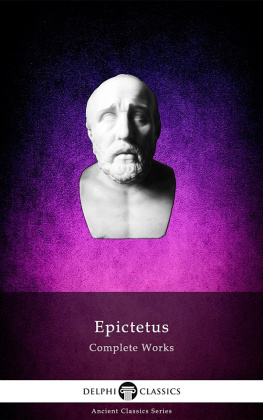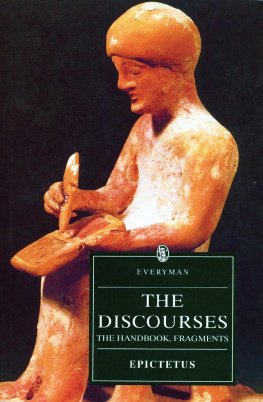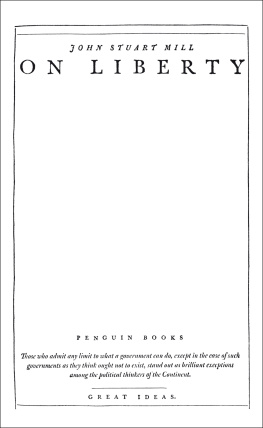Epictetus
Of Human Freedom
TRANSLATED BY ROBERT DOBBIN
PENGUIN BOOKS GREAT IDEAS
PENGUIN BOOKS
Published by the Penguin Group
Penguin Books Ltd, 80 Strand, London WC2R 0RL , England
Penguin Group (USA) Inc., 375 Hudson Street, New York, New York 10014, USA
Penguin Group (Canada), 90 Eglinton Avenue East, Suite 700, Toronto, Ontario, Canada M4P 2Y3
(a division of Pearson Penguin Canada Inc.)
Penguin Ireland, 25 St Stephens Green, Dublin 2, Ireland (a division of Penguin Books Ltd)
Penguin Group (Australia), 250 Camberwell Road, Camberwell, Victoria 3124, Australia
(a division of Pearson Australia Group Pty Ltd)
Penguin Books India Pvt Ltd, 11 Community Centre, Panchsheel Park, New Delhi 110 017, India
Penguin Group (NZ), 67 Apollo Drive, Rosedale, North Shore 0632, New Zealand
(a division of Pearson New Zealand Ltd)
Penguin Books (South Africa) (Pty) Ltd, 24 Sturdee Avenue, Rosebank, Johannesburg 2196, South Africa
Penguin Books Ltd, Registered Offices: 80 Strand, London WC2R 0RL , England
www.penguin.com
This translation taken from Discourses and Selected Writings first published by Penguin Classics 2008
This selection first published in Penguin Books 2010
Translation copyright Robert Dobbin, 2008
Selection copyright Robert Dobbin, 2010
The discourses are taken from: Book I 1, 2, 12, 24 and 25; Book II 1, 13, 15, 17 and 18; Book III 1 and 20; Book IV 1, 2 and 4
All rights reserved
Except in the United States of America, this book is sold subject to the condition that it shall not, by way of trade or otherwise, be lent, re-sold, hired out, or otherwise circulated without the publishers prior consent in any form of binding or cover other than that in which it is published and without a similar condition including this condition being imposed on the subsequent purchaser
ISBN: 978-0-14-194126-4
Epictetus
c. AD 55135
1
Concerning what is in our power and what is not
[1] In general, you will find no art or faculty that can analyse itself, therefore none that can approve or disapprove of itself. [2] The art of grammar is restricted to analysing and commenting on literature. Music is confined to the analysis of harmony. [3] Consequently neither of them analyses itself. Now, if you are writing to a friend, the art of grammar will help you decide what words to use; but it will not tell you whether it is a good idea to write to your friend in the first place. Music is no different; whether this is a good time to sing and play, or a bad one, the art of music by itself cannot decide.
[4] So what can? The faculty that analyses itself as well as the others, namely, the faculty of reason. Reason is unique among the faculties assigned to us in being able to evaluate itself what it is, what it is capable of, how valuable it is in addition to passing judgement on others.
[5] What decides whether a sum of money is good? The money is not going to tell you; it must be the faculty that makes use of such impressions reason. [6] Reason, in addition, takes the measure of music, grammar and the other arts, judging their benefit and deciding when its best to use them.
[7] So its only appropriate that the gods have given us the best and most efficacious gift: the ability to make good use of impressions. Other capacities they did not put in our power. [8] Was it because they did not want to? Personally, I believe that they would have endowed us with those others too, had they been able. But they were not. [9] Since we are on earth, you see, bound to a material body and material things, we can hardly avoid being limited by these extraneous factors.
[10] Well, what does Zeus say? Epictetus, if it were possible, I would have made your little body and possessions both free and unrestricted. [11] As it is, though, make no mistake: this body does not belong to you, it is only cunningly constructed clay. [12] And since I could not make the body yours, I have given you a portion of myself instead, the power of positive and negative impulse, of desire and aversion the power, in other words, of making good use of impressions. If you take care of it and identify with it, you will never be blocked or frustrated; you wont have to complain, and never will need to blame or flatter anyone. [13] Is that enough to satisfy you?
Its more than enough. Thank you.
[14] And yet, while there is only the one thing we can care for and devote ourselves to, we choose instead to care about and attach ourselves to a score of others: to our bodies, to our property, to our family, friends and slaves. [15] And, being attached to many things, we are weighed down and dragged along with them. [16] If the weather keeps us from travelling, we sit down, fret, and keep asking, Which way is the wind blowing? From the north. Thats no good. When will it blow from the west? When it wants to, or rather when Aeolus wants it to; because God put Aeolus in charge of the winds, not you. [17] What should we do then? Make the best use of what is in our power, and treat the rest in accordance with its nature. And what is its nature? However God decides.
[18] Must I be beheaded now, and alone? Well, do you want everyone to be beheaded just because misery loves company? [19] Why not hold out your neck the way Lateranus did at Rome, when condemned by Nero to be beheaded? He held out his neck willingly to take the blow but the blow was deficient, so he recoiled a bit, but then had enough self-command to offer his neck a second time. [20] And prior to that, when Epaphroditus, Neros freedman, approached a certain man and asked him about the grounds of his offence, he replied, If I want anything, I will tell it to your master.
[21] What should we have ready at hand in a situation like this? The knowledge of what is mine and what is not mine, what I can and cannot do. [22] I must die. But must I die bawling? I must be put in chains but moaning and groaning too? I must be exiled; but is there anything to keep me from going with a smile, calm and self-composed?
Tell us your secrets.
[23] I refuse, as this is up to me.
I will put you in chains.
Whats that you say, friend? Its only my leg you will chain, not even God can conquer my will.
[24] I will throw you into prison.
Correction it is my body you will throw there.
I will behead you.
Well, when did I ever claim that mine was the only neck that couldnt be severed?
[25] Thats the kind of attitude you need to cultivate if you would be a philosopher, the sort of sentiments you should write down every day and put in practice.
[26] Thrasea used to say, I would sooner be killed today than banished tomorrow. [27] And what did Musonius say to him? If you choose death because it is the greater evil, what sense is there in that? Or if you choose it as the lesser evil, remember who gave you the choice. Why not try coming to terms with what you have been given?
[28] Agrippinus used to say, I dont add to my troubles. To illustrate, someone once said to him, You are being tried in the Senate [29] good luck. But it was eleven in the morning, and at that hour he was in the habit of taking his bath and exercise. Let us be off to exercise. [30] When he was done, word came that he had been condemned. To exile, he asked, or death? Exile. And my estate, what about that? It has not been confiscated. Well then, let us go to my villa in Aricia and have lunch there. [31] This shows what is possible when we practise what is necessary, and make our desire and aversion safe against any setback or adversity. [32] I have to die. If it is now, well then I die now; if later, then now I will take my lunch, since the hour for lunch has arrived and dying I will tend to later. How? As someone who knows that you have to return what belongs to somebody else.
Next page
